Filter by
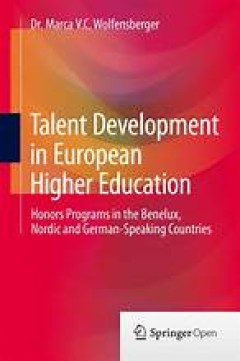
Talent Development in European Higher Education
This book examines the much-debated question of how to unleash the potential of young people with promising intellectual abilities and motivation. It looks at the increasingly important topic of excellence in education, and the shift in focus towards the provision of programs to support talented students in higher education. It provides a systematic overview of programs for talented students at…
- Edition
- 1
- ISBN/ISSN
- 978-3-319-12919-8
- Collation
- politik
- Series Title
- -
- Call Number
- 324
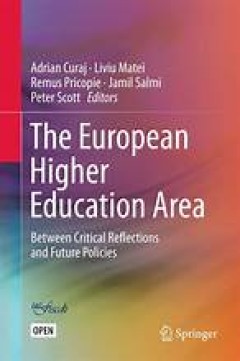
The European Higher Education Area
Bridging the gap between higher education research and policy making was always a challenge, but the recent calls for more evidence-based policies have opened a window of unprecedented opportunity for researchers to bring more contributions to shaping the future of the European Higher Education Area (EHEA). Encouraged by the success of the 2011 first edition, Romania and Armenia have organised …
- Edition
- 1
- ISBN/ISSN
- 978-3-319-20877-0
- Collation
- politik
- Series Title
- -
- Call Number
- 324
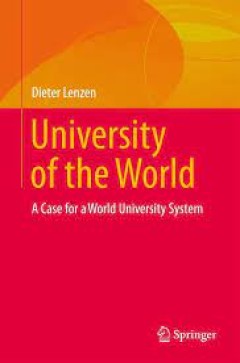
University of the World A Case for a World University System
In this book, Dieter Lenzen analyzes the world's three major educational systems: the Continental-European, the Atlantic (Anglo-American) and the East Asian. Distancing himself from the current trend towards the economically driven Anglo-American system of education, the author proposes an alternative model, "a university of the world". Contents: · Three concepts of the universit…
- Edition
- -
- ISBN/ISSN
- 978-3-319-13455-0
- Collation
- -
- Series Title
- -
- Call Number
- -

University Governance in (Post-)Conflict Southern Sudan 2005–2011 The Nexu…
Few studies have looked into the governance of universities in societies affected by armed conflicts, because they are either meant for practitioners or focused on the role of universities for peace and development. Akiiki Babyesiza offers an in-depth analysis of the relationship between state, higher education, and society in a multicultural and multi-religious post-conflict setting and uses e…
- Edition
- -
- ISBN/ISSN
- 978-3-658-08145-4
- Collation
- -
- Series Title
- -
- Call Number
- -
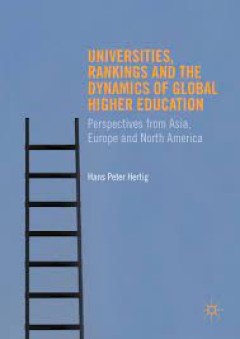
Universities, Rankings and the Dynamics of Global Higher Education Perspecti…
Global university rankings are now more than a decade old and this book uses the data they have produced to examine how the international landscape of universities has changed over the years. It offers new insights into the power and limits of league tables, a key element of globalized higher education that can be deplored but hardly ignored. Case studies from Asia, Europe and North America are…
- Edition
- -
- ISBN/ISSN
- 978-1-137-46999-1
- Collation
- -
- Series Title
- -
- Call Number
- -
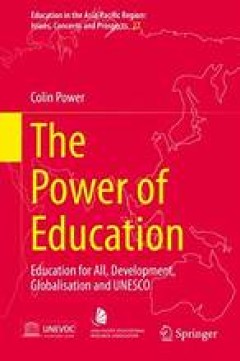
The Power of Education
This book is about the power of education: the kind of education that simultaneously improves the quality of life both of individuals and the wider society. It explains why education must be viewed as a basic human right, as a value in and of itself, and reviews the evidence on how education builds the human resources that individuals and nations need to be productive, to continue to learn, to …
- Edition
- 1
- ISBN/ISSN
- 978-981-287-221-0
- Collation
- Ekonomi
- Series Title
- Education in the Asia-Pacific Region: Issues, Concerns and Prospects
- Call Number
- 330
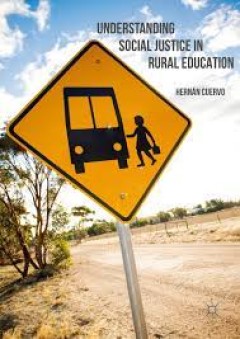
Understanding Social Justice in Rural Education
This book explores what social justice looks like for rural schools in Australia. The author challenges the consensus that sees the distribution of resources as the panacea for the myriad challenges faced by rural schools and argues that the solution to inequality and injustice in rural settings has to take into account other important dimensions of social justice such as recognition and associ…
- Edition
- -
- ISBN/ISSN
- 978-1-137-50515-6
- Collation
- -
- Series Title
- -
- Call Number
- -

The European Higher Education Area: Between Critical Reflections and Future P…
Higher Education; Educational Policy and Politics; International and Comparative Education
- Edition
- -
- ISBN/ISSN
- 9783319208770
- Collation
- -
- Series Title
- -
- Call Number
- -
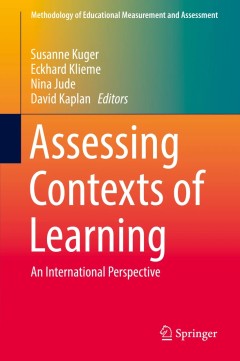
Assessing Contexts of Learning: An International Perspective
This volume brings together educational effectiveness research and international large-scale assessments, demonstrating how the two fields can be applied to inspire and improve each other, and providing readers direct links to instruments that cover a broad range of topics and have been shown to work in more than 70 countries. The book’s initial chapters introduce and summarize recent discuss…
- Edition
- Ed. 1
- ISBN/ISSN
- 978-3-319-45357-6
- Collation
- XII, 490
- Series Title
- Methodology of Educational Measurement and Assessment
- Call Number
- 370 ASS a

Innovative Business Education Design for 21st Century Learning
This volume explores two aspects of change within higher education: macro factors governing and influencing the institutional environment, and micro issues taking place within the institutions themselves. The first part of the book examines some of the micro issues that influence business and economics pedagogy. It presents reflections and analyses of teaching roles and values, the enhancement …
- Edition
- -
- ISBN/ISSN
- 978-3-319-32620-7
- Collation
- XII, 143
- Series Title
- -
- Call Number
- 370 INN
 Computer Science, Information & General Works
Computer Science, Information & General Works  Philosophy & Psychology
Philosophy & Psychology  Religion
Religion  Social Sciences
Social Sciences  Language
Language  Pure Science
Pure Science  Applied Sciences
Applied Sciences  Art & Recreation
Art & Recreation  Literature
Literature  History & Geography
History & Geography